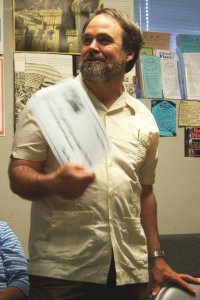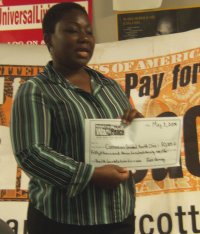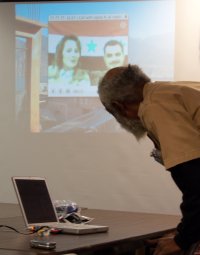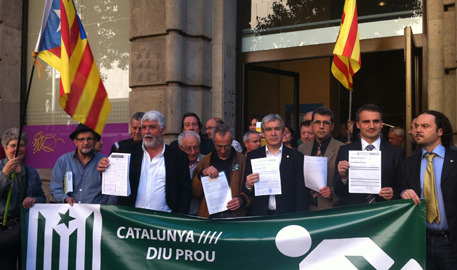I’m back from the NWTRCC Conference in Birmingham, Alabama, which I was able to attend thanks to the generosity of NWTRCC and Northern California War Tax Resistance.
The conference, a regularly-scheduled business & strategy meeting of NWTRCC, brought together about 20 dedicated members from across the country — some of whom have decades of experience with tax resistance — and also drew some curious locals who are just getting their feet wet. Our hosts did an incredible job of organizing beds, meals, and transportation, and making us feel comfortable and at home, so that we could keep our minds on a challenging agenda throughout .
, at the national gathering in Santa Rosa, I was the curious local getting my feet wet. , I was appointed to a term as an alternate on the national administrative committee.
I’d been reluctant to consider taking on a responsibility like this in the past, for one reason because we already had an AdCom member from Northern California, and for another because I thought I might not be sufficiently on-the-same-page with the group as a whole (for instance, not being much of a “progressive” and thinking the “Peace Tax Fund Act” is worse than worthless).
But then the AdCom member from our area resigned, and the more I thought about NWTRCC the more I realized that we’re a wildly diverse lot ideologically and we manage to comfortably fit on the “same page” anyway. For the most part, we’re pretty good at concentrating on the stuff we agree on and treating the diversity of perspectives on other issues as a strength rather than a nuisance.
During the conference, we heard reports of Tax Day actions and general status reports from local groups around the country. These varied a lot in tone, with some groups reporting a surge of interest and enthusiasm, while others were discouraged at diminishing membership and activity.
We spent a lot of time reviewing the War Tax Boycott — what worked, what didn’t work, and whether we should continue it in some form or change tactics. I have mixed feelings about the Boycott.
On the plus side, I think that it provided a good project for us to focus our energies on, and it was a good wedge for publicity and outreach. I think that it’s very likely that our project inspired, perhaps subliminally, the parallel war tax resistance projects that sprung up last year — Code Pink’s “Don’t Buy Bush’s War” campaign and Christian Peace Witness for Iraq’s “Pledge for Peace.”

Bill Ramsey at the War Tax Boycott press conference
However, these are largely side-effects. In terms of the goals we explicitly set for the Boycott — which seemed to me to involve creating and maintaining a large-scale mass resistance and redirection campaign — I think the Boycott was mostly a flop. It was unable to even reach a large percentage of current NWTRCC members to convince them to sign on. My feeling is that we could use our resources, time, and energy more productively in the future by pursuing more realistic goals or by partnering with other organizations that have the resources to lead the sort of campaign we have in mind.
However, mine was very much a minority position. And I heard enough about how useful the Boycott campaign had been to people in their local outreach that I became convinced that the campaign should continue in some form. At the meeting, we agreed to spend some time reassessing and restructuring it, but to commit to continue it for at least.
On , Bill Ramsey, who has been the main organizer behind the Boycott effort, organized a press conference to announce that $325,000 had been redirected by boycotters from the Pentagon to humanitarian projects.

Antor Odu Ndep, executive director of Common Ground Health Clinic, accepts redirected taxes
Antor Odu Ndep, executive director of the Common Ground Health Clinic in New Orleans, was on-hand to accept a check representing donations from tax boycotters and to talk about what the clinic has done and is doing to help people in New Orleans in the aftermath of Hurricane Katrina.
Najlaa al-Nashi of Direct Aid Iraq joined the press conference by an audio/video link to talk about how that organization will use the redirected funds to help provide medical care for refugees from the Iraq War.

Tax resister Joffre Stewart speaks with representatives of the Direct Aid Initiative on a videoconference from Jordan
The event was the lead story that evening on the local Fox news affiliate, which, believe it or not, played it no less fairly than the news media usually does.
The Birmingham News also had a reporter on site, who fired off a quick note afternoon, and then filed a more complete story for the edition, featuring local resister David Waters:
David Waters’ protest started .
The Vietnam veteran couldn’t support the United States’ first Gulf War, what he calls a “slaughter in the desert.” So he stopped paying his federal taxes.
“It just went against my conscience,” said Waters, a 61-year-old carpenter who lives in the Avondale community of Birmingham.
Today, he is one of more than 520 U.S. citizens from 44 states who refused to pay some or all of their federal taxes and pledged to redirect the money — more than $325,000 — to humanitarian causes.
On , a New Orleans health care clinic and an Iraqi refugee aid group accepted about $95,000 in gifts and pledges through the anti-war tax boycott.
The National War Tax Resistance Coordinating Committee, the organization that led the boycott, met in Birmingham to award some of the monetary gifts.
The Common Ground Health Clinic, a free clinic in New Orleans, received more than $50,000 in pledges. The Direct Aid Initiative, or Direct Aid Iraq, got more than $44,400 of the would-be taxes. Other “tax resisters” gave to local projects or humanitarian causes of their choosing, member Bill Ramsey said.
Najlaa al-Nashi, with the Iraqi refugee organization, said over teleconference afternoon from Jordan that her organization was grateful for the money.
Daniel Woodham put $300 on the table after al-Nashi spoke.
“I thank you so much for putting it to much better use than my government ever would,” said Woodham of Greensboro, N.C.
Woodham said he hasn’t paid his taxes , which he estimates amounts to about $15,000 before penalties.
The 43-year-old farmer and English language teacher files every year with a letter explaining where he is redirecting his money. Woodham said he questions why his federal taxes should go “to kill people.”
“I don’t think it increases our safety. I don’t think it increase our integrity around the world,” he said. “I’m a conscientious objector.”
After the press conference, we returned to the Quaker Meeting house and I facilitated a workshop on how to talk to people about war tax resistance. Mostly I was concerned with how we should respond when we’re promoting the tactic to activists who aren’t currently tax resisters, and then they throw up one of the dozen or so objections we’ve all heard before.
This was largely an extension of what I discussed here , with a focus on one-on-one communication as opposed to talking to and through the press.
After going on at some length about these theories of mine that I’m so proud of, I opened it up to the group by play-acting a potential resister who is raising excuses (in each of the needs / fears / values categories) as to why they don’t think tax resistance is right for them, and asking how the resisters present would answer the objections.
I thought it went well, provided a lot of food for thought, and could help to make us more persuasive as we go back home, away from the true believers, and have to respond to the old familiar objections again.
That evening we heard David Waters tell the gripping and fascinating story of the path he has taken in his life, from being an Army Special Forces volunteer in the Vietnam War, to being a “revenuer” for a liquor-law enforcement agency, to being a war tax resister.
I’ve left out a lot of nitty-gritty that occupied a lot of our time, but probably doesn’t have a whole lot of interest to those not already elbow-deep in the springs & gears of the organization.
I brought down six copies of We Won’t Pay!: A Tax Resistance Reader, figuring that if this wasn’t a good opportunity to find its audience nothing was. Of the six, I gave away one to our hosts and sold seven (that is to say, I had to place quick orders for two more to keep up with demand).
I can’t convey, but should certainly mention, one of the most important parts of the meeting, which is just to be able to meet face-to-face and share stories and outlooks and be together in a group where tax resistance isn’t a frightening fringe idea but is the center of discussion.


